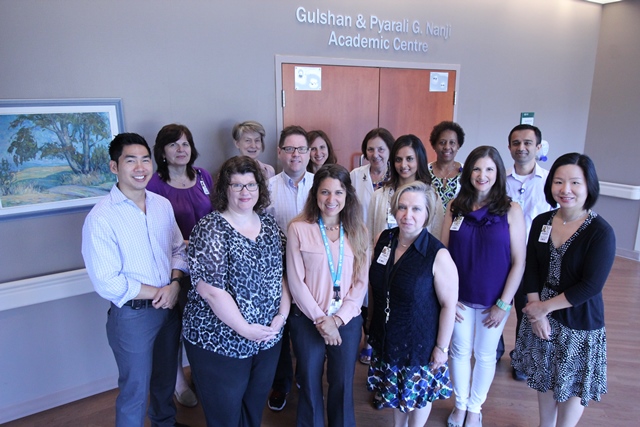
Palliative Care program receives prestigious national designation
By Elizabeth McCarthy
While under the care of staff and physicians from North York General Hospital’s (NYGH) Freeman Centre for the Advancement of Palliative Care, Pat (Patricia) Mackey wanted people to know that “palliative care is about finding energy and joy in your day, not focusing on the illness.”
This explanation of palliative care by one of its own patients is what distinguishes NYGH’s palliative care program from the rest. Caring for the whole person, not just their symptoms, is a large part of the reason the Freeman Centre was recently designated a Leading Practice by Accreditation Canada.
Every year hundreds of submissions are made to Accreditation Canada’s Leading Practices Database. Leading Practices must be creative and innovative, client- or family-centred, evaluated, sustainable, able to demonstrate successful results, and be adaptable by other organizations.
The review process is rigorous; only 35% to 40% of submissions become Leading Practices.
The Freeman Centre is the only adult palliative care program in Canada to be recognized in its entirety as a Leading Practice by Accreditation Canada.
Established in 1999, the Freeman Centre is a patient- and family-centred program that provides an added layer of support to patients with advanced serious illnesses. Originally, it was a group of dedicated family physicians who identified the need for a community-based service to support palliative cancer patients who wished to die at home and their families. The Freeman Centre’s multidisciplinary team of physicians, advance practice nurses, nurses, social workers, researchers, chaplains, and other allied health professionals work with a patient’s family and care providers to deliver comprehensive inpatient, outpatient and home-based care.
Initially the Freeman Centre cared for patients with terminal cancer diagnoses. The program has since expanded over the last 16 years, and now includes palliative care consultations across NYGH for cancer and non-cancer illnesses. As well, outpatient services care for patients with advanced congestive heart failure (CHF) and respiratory illnesses.
“Having access to comprehensive, high-quality palliative care services improves a patient’s overall care and quality of life while decreasing the number of unnecessary emergency department visits and intensive care unit (ICU) admissions,” says Dr. Daryl Roitman, Director, Freeman Centre for the Advancement of Palliative Care, NYGH. “I am proud to work with such a dedicated group of people every day.”
Accreditation Canada’s Leading Practices Database fosters the sharing of best practices between health care organizations. To date, the database includes over 1,000 practices recognized as being particularly innovative and effective in improving the quality of care. These practices are leading in a service delivery area, in a particular health care setting, or for a specific health care challenge. Some are ingenious in their simplicity. Often, they are implemented by organizations with limited resources, showing how innovative and creative strategies can achieve positive results at a minimal cost.
“Congratulations to the team at North York General Hospital on receiving its second Leading Practice award,” said Leslee Thompson, Chief Executive Officer, Accreditation Canada. “This palliative care program is an innovative example of a multidisciplinary approach that optimizes the care experience for patients and families.”
This is the second time a North York General program has received a Leading Practice designation. The Hip and Knee Integrated Care Collaborative was named a 2015 Leading Practice by Accreditation Canada for its model of care that supports patients needing hip and knee replacements along their entire journey with the support of a nurse/patient navigator.
Elizabeth McCarthy is a Senior Communications Specialist at North York General Hospital.

